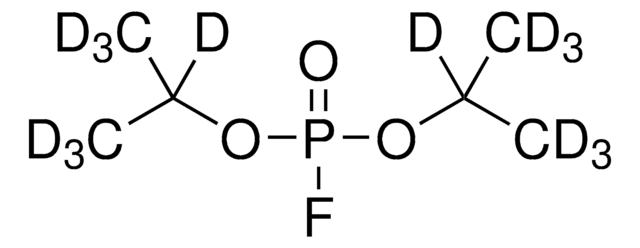Recommended Products
biological source
fermentation/recombinant
form
lyophilized solid
specific activity
≥30 U/mg
storage temp.
−20°C
Packaging
Bottomless glass bottle. Contents are inside inserted fused cone.
Unit Definition
One unit corresponds to the amount of enzyme which hydrolyzes 1 μmol diisopropyl fluorophosphate per minute at pH 8.1 and 22 °C
Signal Word
Danger
Hazard Statements
Precautionary Statements
Hazard Classifications
Resp. Sens. 1
Storage Class Code
11 - Combustible Solids
WGK
WGK 1
Flash Point(F)
Not applicable
Flash Point(C)
Not applicable
Personal Protective Equipment
dust mask type N95 (US), Eyeshields, Gloves
Certificates of Analysis (COA)
Search for Certificates of Analysis (COA) by entering the products Lot/Batch Number. Lot and Batch Numbers can be found on a product’s label following the words ‘Lot’ or ‘Batch’.
Already Own This Product?
Find documentation for the products that you have recently purchased in the Document Library.
Marc-Michael Blum et al.
Biochemistry, 47(18), 5216-5224 (2008-04-10)
A wide range of toxic organophosphorus pesticides and nerve agents is effectively hydrolyzed by the structurally related phosphotriesterase enzymes paraoxonase (PON1) from human plasma and diisopropyl fluorophosphatase (DFPase) from the squid Loligo vulgaris. Both enzymes have potential use as medical
Marc-Michael Blum et al.
Proceedings of the National Academy of Sciences of the United States of America, 106(3), 713-718 (2009-01-13)
Hydrogen atoms constitute about half of all atoms in proteins and play a critical role in enzyme mechanisms and macromolecular and solvent structure. Hydrogen atom positions can readily be determined by neutron diffraction, and as such, neutron diffraction is an
Jürgen Gäb et al.
Analytical and bioanalytical chemistry, 396(3), 1213-1221 (2009-11-28)
The enzyme diisopropyl fluorophosphatase (DFPase, EC 3.1.8.2) from the squid Loligo vulgaris effectively catalyzes the hydrolysis of diisopropyl fluorophosphate (DFP) and a number of organophosphorus nerve agents, including sarin, soman, cyclosarin, and tabun. Until now, determination of kinetic data has
Julian C H Chen et al.
Acta crystallographica. Section D, Biological crystallography, 66(Pt 11), 1131-1138 (2010-11-03)
Diisopropyl fluorophosphatase (DFPase) is a calcium-dependent phosphotriesterase that acts on a variety of highly toxic organophosphorus compounds that act as inhibitors of acetylcholinesterase. The mechanism of DFPase has been probed using a variety of methods, including isotopic labelling, which demonstrated
Debra A Gearhart et al.
Toxicology and applied pharmacology, 218(1), 20-29 (2006-11-25)
Diisopropylfluorophosphate, originally developed as a chemical warfare agent, is structurally similar to nerve agents, and chlorpyrifos has extensive worldwide use as an agricultural pesticide. While inhibition of cholinesterases underlies the acute toxicity of these organophosphates, we previously reported impaired axonal
Our team of scientists has experience in all areas of research including Life Science, Material Science, Chemical Synthesis, Chromatography, Analytical and many others.
Contact Technical Service









